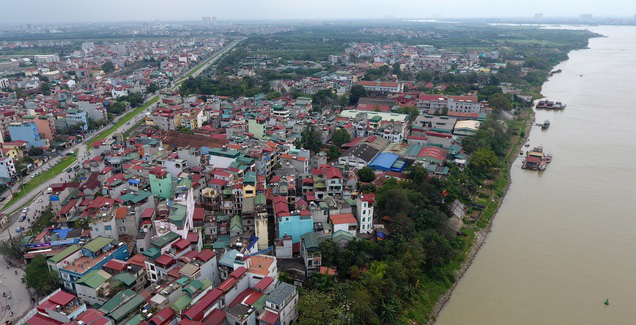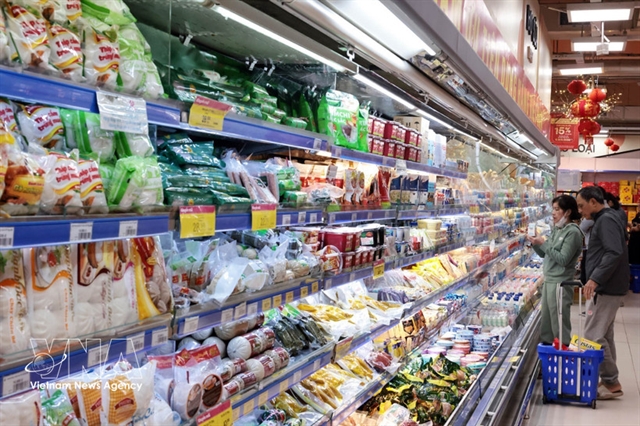 Economy
Economy


|
| Land near the Red River dike is also offered a price of up to VNĐ50-55 million sq.m, nearly double from before due to the Red River urban area planning. — Photo dantri.com.vn |
HÀ NỘI — Property prices in some areas of Hà Nội have surged strongly after reports on draft planning for the Red River urban area were released in June.
The Red River urban planning project aims to develop an area of about 11,000 hectares in 13 districts including Đan Phượng, North Từ Liêm, Tây Hồ, Ba Đình, Hoàn Kiếm, Hai Bà Trưng, Hoàng Mai, Thanh Trì, Thường Tín, Mê Linh, Đông Anh, Long Biên and Gia Lâm.
Per the project, there will be dozens of bridges built across the Red River and many parks, and cultural, tourist, service and entertainment works, modern ecological urban areas will also be built on both sides of the Red River.
The plans have led to expectations that property prices in this area will increase strongly, especially after the planning is approved.
The trading of property in Cự Khối Ward in Long Biên District has increased strongly, reported the Vietnam News Agency.
According to Nguyễn Quang Huy - a real estate broker - the current price is VNĐ68-70 million per sq.m for a house with one frontage and VNĐ70-72 million per sq.m for a house with two fronts, higher than the previous price of VNĐ40-50 million.
If this urban project is approved, the land price would increase further, even up to VNĐ80-90 million, Huy said.
Lê Thị Minh, from Cự Khối Ward, said in the last two weeks, many people had come to ask about land in this area, causing land prices to rise. The price had increased by VNĐ5-10 million per sq.m to VNĐ37-40 million for a plot of land in Cự Khối Street.
In some areas in Đông Anh District, land prices have also surged by about VNĐ10-12 million per sq.m, especially in the area of Tàm Xá and Xuân Canh communes overlooking the Red River urban area, to VNĐ28-30 million against prices from a month ago.
Land near the Red River dike is also offered a price of up to VNĐ50-55 million sq.m, nearly double from before due to the Red River urban area planning, a broker said.
Land price prices have also increased in Hoài Đức District, including Vườn Cam urban area, near Vân Canh University, Lideco North 32, Kim Chung-Di Trạch, Hà Đô Charm Villas and An Lạc Symphony.
Of which, the strongest increase in land price is Kim Chung-Di Trạch Urban Area, where the price was only about VNĐ20-35 million per sq.m in mid-2020 and has jumped to VNĐ40-70 million at present. This price is expected to surge to VNĐ55-95 million due to good infrastructure.
In the Mê Linh District, the property price has increased to VND15-30 million per sq.m since the beginning of 2021 in many projects, including Cienco5, AIC, Diamond Park View, Hà Phong, Hoàng Vân and Melinh Vista City projects.
According to real estate experts, there are two trends for property investment on the banks of the Red River, including swing trading and buying of land for compensation or higher price in the future.
Experts believe the rising property prices are due to information about infrastructure planning and investment.
In the area along the Red River, land brokers have been accused of price manipulation to push the property price up 2-3 times. If the planning project is approved, both landowners and brokers may continue to take this advantage to push prices upwards.
According to Nguyễn Văn Đính, deputy general secretary of the Việt Nam Real Estate Association, the increase in land prices usually depends on the level of investment in infrastructure. If there is planning in principle or drawings, an increase of about 3-5 per cent is reasonable.
If the land price is too high, it will hinder the development of the real estate market in those areas.
Hà Quang Hưng, deputy director of the Housing and Real Estate Market Management Department under the Ministry of Construction, said land prices had increased by 50 per cent compared to 2019 in some places in Hoài Đức District and 20-30 per cent year-on-year in the districts of Đông Anh, Gia Lâm and Long Biên.
The strong increase of real estate prices in some areas of Hà Nội was mainly due to speculators taking advantage of real estate information to create price fluctuations, such as urban planning and investment policies for major infrastructure projects.
To stabilise the real estate market, the Ministry of Construction this year would build a mechanism to minimise the imbalance in the product structure of the market.
The ministry would also propose solutions to strengthen supervision of the market to reduce price manipulation. VNS




